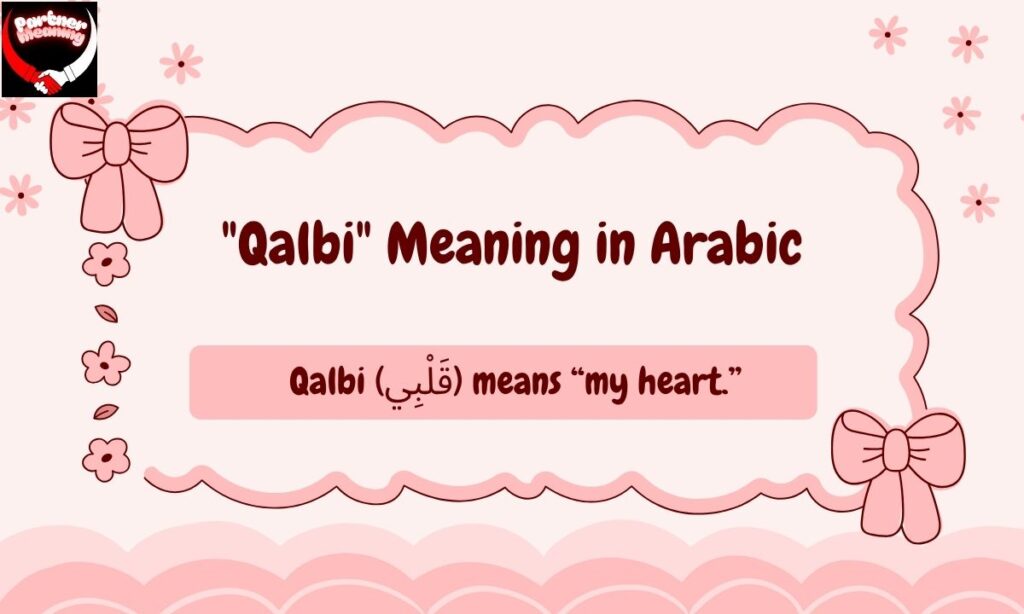Discover the beauty of the Arabic word “Qalbi” and how it’s used in everyday life. From expressing emotions to poetic phrases, this word shows deep connection. Explore examples that bring qalbi to life.
What Does Qalbi Mean?
Qalbi (قلبي) is one of the most emotional and affectionate words in Arabic. It literally means “my heart” and is used to express love, care, and deep personal connection. People use it in daily conversations, poetry, and songs to convey strong feelings. The word itself carries warmth and intimacy, making it very popular in both formal and informal Arabic.
English Translation
The simplest translation of qalbi (قلبي) is “my heart.” The word comes from qalb (قلب) meaning heart, and adding -i shows possession, so it literally becomes “my heart.” In English, it is used in both literal and figurative contexts, just like in Arabic. When someone says “qalbi”, it can indicate love, sadness, or concern depending on the situation.
Different Emotional Uses of Qalbi
Qalbi is highly versatile in expressing emotions. For example, ya qalbi (يا قلبي) is often used to comfort oneself or show empathy. It can express:
- Love and affection
- Sadness or heartbreak
- Joy or happiness
- Empathy for someone else’s feelings
Using qalbi in conversation makes speech feel personal and heartfelt, and it appears in texts, social media, and poetry frequently.
Linguistic Root of Qalbi
The word qalbi (قلبي) comes from the root q-l-b (ق-ل-ب), which is linked to the heart, emotions, and change. In Arabic, many words come from roots that convey a broad semantic field, and qalb is no exception. It represents both the physical heart and the emotional or spiritual center of a person. Knowing the root helps learners understand related words and their meanings.
Origin from Qalb (Heart)
The base word qalb (قلب) means heart. When you add -i, it becomes qalbi (my heart). Arabic often shows possession by adding suffixes to the noun. This form is used widely in spoken Arabic, written literature, and religious texts. Understanding the base helps learners see how qalbi fits into larger expressions of emotion.
Possessive Forms in Arabic
Arabic uses suffixes to show ownership or possession, making expressions personal. Common forms include:
- -i = my → qalbi (قلبي)
- -ka / -ki = your → qalbuka / qalbuki (قلبك / قلبكِ)
- -hu / -ha = his/her → qalbuhu / qalbuha (قلبه / قلبها)
- -na = our → qalbuna (قلبنا)
These forms are essential for correctly expressing emotions and are widely used in everyday conversations, literature, and religious texts.
Common Phrases with Qalbi
Qalbi is part of many popular Arabic phrases that express deep feelings. Using it in sentences shows intimacy, love, and care, making speech sound natural and emotional.
Examples in Daily Use
Here are some commonly used phrases with qalbi:
- Ana uhibbuka min kulli qalbi (أنا أحبك من كل قلبي) – I love you with all my heart. This is one of the most direct ways to express deep love.
- Min a‘maq qalbi (من أعماق قلبي) – From the depths of my heart. Used to show sincerity or heartfelt emotion.
- Qalbi maksur (قلبي مكسور) – My heart is broken. Commonly used in sad or emotional contexts.
- Ant qalbi (أنت قلبي) – You are my heart. Expresses endearment and closeness to someone special.
Why These Phrases Matter
These phrases are widely used in spoken Arabic, text messages, social media, and literature. Using them correctly helps learners sound natural and emotionally intelligent. They also reflect Arabic cultural values, where the heart is seen as the center of emotion, spirituality, and human connection.
Cultural and Quranic Significance
Qalb (قلب) is considered the center of emotions, spirituality, and understanding in Arabic culture. It represents both the physical heart and the emotional or spiritual self. People often use qalbi (قلبي) in conversation to express love, care, or deep feelings. Its importance is reflected in both literature and religious texts, making it a key word to learn.

Qalb in the Quran
The word qalb (قلب) appears frequently in the Quran, symbolizing the spiritual heart and understanding. It often highlights the difference between physical sight and inner perception. For example, Allah says:
- فَإِنَّهَا لَا تَعْمَى الْأَبْصَارُ وَلَٰكِن تَعْمَى الْقُلُوبُ الَّتِي فِي الصُّدُورِ – “It is not the eyes that are blind, but the hearts within the chests.”
This shows the heart as the seat of wisdom, faith, and emotion, emphasizing the spiritual connection in Islamic teachings.
Usage in Daily Life and Poetry
In daily life, phrases like ya qalbi (يا قلبي) and min a‘maq qalbi (من أعماق قلبي) are common. They are used to express love, comfort, or concern. In Arabic poetry and songs, qalbi adds depth and emotional resonance. Some examples include:
- Expressing affection to family or friends
- Comforting someone in sadness or grief
- Highlighting deep emotional or spiritual experiences
Using qalbi in literature or speech connects the emotional and spiritual aspects of the language, making it versatile and culturally rich.
Common Misunderstandings or Mistakes
Many learners confuse qalb (قلب) and qalbi (قلبي). Qalb refers to the heart in general, while qalbi means “my heart.” Using the wrong form can change the meaning in conversation or writing.
Dialect differences can also create confusion. For example, alby (قلبي) is an informal, colloquial version used in Egyptian Arabic, while qalbi (قلبي) is standard. Being aware of these differences helps in speaking naturally.
Technical & Uncommon Uses
Some uses of qalbi are technical or medical. These are less common in daily speech but important in specific contexts:
- Manbuh qalbi (منبه قلبي) – Pacemaker
- Rusum qalbi (رسم قلبي) – Cardiogram
These terms show that qalbi can refer to the physical heart, not just emotions. Medical professionals and students often use them in Arabic health and science texts.
Why You Should Learn Qalbi
Learning qalbi (قلبي) helps express emotions naturally in Arabic. It is essential for speaking, texting, or writing in a way that feels personal and heartfelt.
Understanding qalbi also improves comprehension of Quranic verses and poetic expressions. Using affectionate phrases like ya qalbi (يا قلبي) correctly makes communication more meaningful.
Conclusion
Qalbi (قلبي) is more than just a word; it expresses love, emotion, and spiritual depth. From daily conversations to poetry and the Quran, it holds cultural significance. Learning qalbi helps communicate affection naturally and understand Arabic better. Using it correctly connects the heart and language in meaningful ways.
Frequently Asked Questions
What does qalbi mean in Arabic?
It means “my heart” and expresses love or emotion.
What is the root of qalbi?
The root is qalb (قلب), meaning heart.
Can qalbi be used in daily conversation?
Yes, phrases like ya qalbi (يا قلبي) are common.
What is the difference between qalb and qalbi?
Qalb = heart, qalbi = my heart (possessive).
Are there dialect versions of qalbi?
Yes, alby (قلبي) is used in Egyptian Arabic.

Hayyat is a passionate writer and researcher who loves exploring the beauty and depth of Arabic language and culture. With a special interest in Arabic names, Qur’anic words, and Islamic heritage, Hayyat aims to share meaningful insights with readers who appreciate names with purpose and history.











